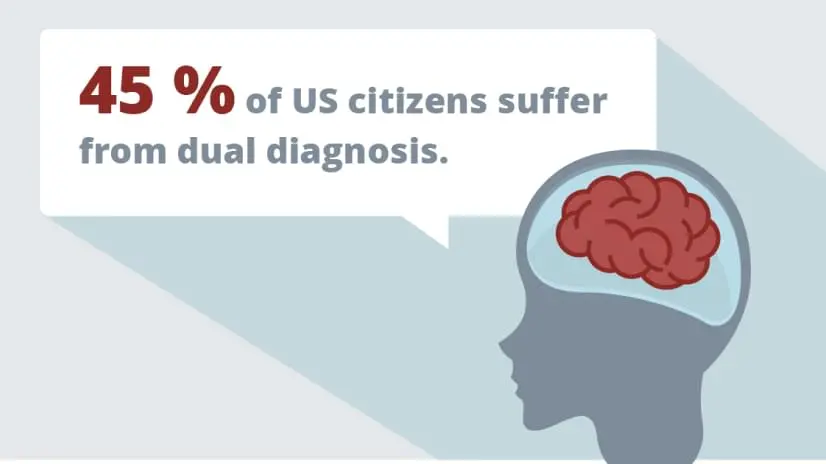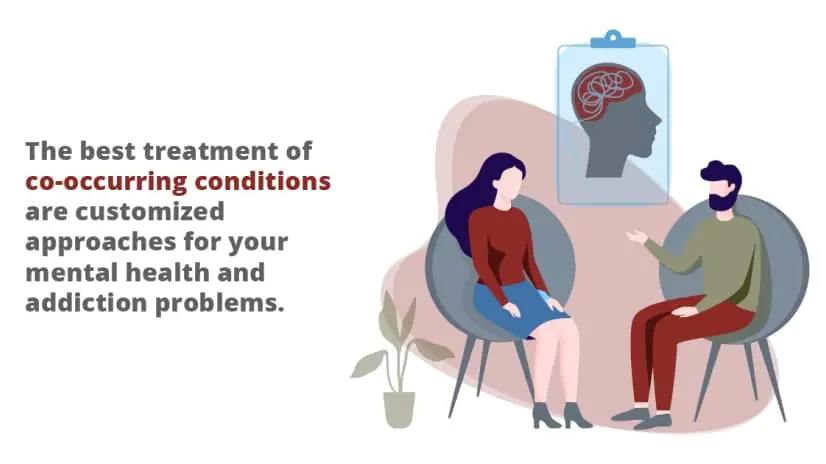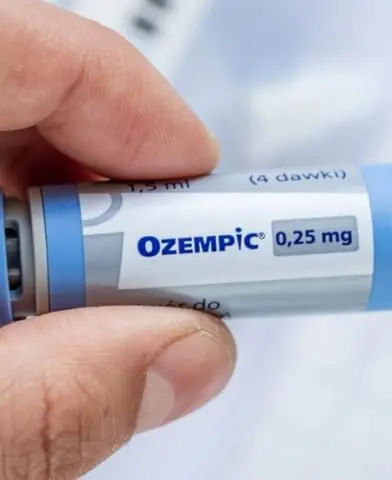
Why is Dual Diagnosis Important for Alcoholism Treatment?
Clinically Reviewed by:
It’s called a dual diagnosis or co-occurring disorder when you have alcoholism—or alcohol use disorder (AUD)—and a mental health struggle like anxiety or depression. Dealing with a mental health condition like addiction isn’t simple, and it becomes more complex when you add suffering from other issues. Substance abuse and mental health are deeply linked.

Why Dual Diagnosis and Co-Occurring Disorders Matter
These additional symptoms (such as mania in bipolar disorder) can significantly change the look and course of your treatment for alcoholism. They may get in your way when you try to keep up with your treatment and block you from making significant, new changes in your life. And, the conditions themselves can influence each other.
When a mental health condition and alcohol use disorder co-occur—you may notice the alcoholism worsens when depression, for example, goes untreated. And, mental health conditions you may have can also change when the alcoholism goes untreated, allowing you to fall into new and worsening symptoms because of uncontrolled drinking.
Where Alcoholism and Mental Health Intersects
Conditions like depression and anxiety are more prevalent with addiction than many expect. The National Survey on Drug Use and Health (NSDUH) suggests that around 45 percent of our citizens suffer from dual diagnosis; these Americans have a higher instance (about 30 percent) of having a substance use disorder (SUD) than the general population. National institutes and the NSDUH also estimate that alcohol is the primary drug of abuse for an additional 45 percent of patients with co-occurring disorders.
When so many millions of Americans suffer from dual diagnosis and self-medicate with alcohol, effective treatment must accommodate and understand these patients’ experiences to boost recovery. It can be challenging to untangle an AUD and co-occurring condition in some cases because they seem to cause, influence, and instigate each other.
Treatment providers know that mental health conditions and substance use disorders do not improve when one of them is ignored. They are statistically more likely to get worse or result in relapse.
How Dual Diagnosis Affects Substance Abuse
Multiple diagnoses link closely in an individual’s experience of both their alcohol or drug addiction and their mental health. Without necessarily causing one or the other—abusing substances such as alcohol can create mental health symptoms that antagonize and worsen present conditions. With alcohol, in particular, anxiety and depressive symptoms can take a steep turn with prolonged abuse and heavy drinking.
People with AUD use alcohol for mental health struggles.
People sometimes choose to self-medicate when they have a mental health struggle—diagnosed or not. They use the substance to cope with difficult, confusing emotions and temporarily lift their mood, but the side effects can be even more damaging than the short-lived benefits.
Alcohol can increase the risk of developing a disorder.
Genetics, the environment, and other factors can trigger a mental health disorder, activating an issue you may already be at risk for based on your family and personal history. Abusing alcohol may figuratively push you past the limit into the territory of depression, anxiety, or another condition.
Alcohol can worsen symptoms of existing disorders.
Alcohol worsens some existing symptoms and introduces others when combined with a dual diagnosis. Alcohol notoriously and often dangerously interacts with medications, which could mean the consumption of alcohol impedes your existing treatments.

How to Spot Dual Diagnosis with Alcoholism
Seeing a co-occurring condition isn’t always simple for treatment professionals. It takes skill and awareness to carefully decide whether a patient’s symptoms result from substance use with alcohol or a feature of their mental health condition. The following questions may get you thinking about how alcohol and a possible mental health condition can interact in your life:
- Has someone in your family experienced a mental health condition or SUD?
- Have you been previously treated for a SUD or mental health disorder?
- Have you noticed a relationship between your moods and your drinking?
- Do you use alcohol to cope with unpleasant feelings and situations?
- Do you still feel negative moods and feelings when you’re sober?
- Do you suspect you have an underlying mental health condition?
It’s essential to accept how alcohol and mental health struggles can affect your life. Taking an honest look at the symptoms and challenges you experience every day can free you to make necessary changes for yourself. No one wishes to admit how much alcohol and mental health issues can steer their life, but they can each happen to anyone. Seeking to understand where these issues come from is vitally helpful in recovery.
What Common Symptoms of Dual Diagnoses Are
Substance abuse disorders like alcoholism commonly co-occur with depression, anxiety, and bipolar disorder. The symptoms of each of these can be worsened or highlighted by alcohol abuse, and alcohol abuse itself can be exacerbated or more pronounced with their symptoms as well.
Depression
In addition to losing a feeling of interest in their daily lives, people who experience depression often struggle with hopelessness and these symptoms:
- Feeling helpless
- Seeing disturbances in sleep
- Gaining or losing weight
- Losing energy or motivation
- Sensing guilt and worthlessness
- Concentrating poorly
- Feeling anger and physical pain
- Engaging in reckless behavior
Anxiety
Beyond the general tensions and worries that come with an anxiety disorder, people who live with the condition also report:
- Being easily startled and “on edge”
- Growing irritability and moodiness
- Racing heart and short breath
- Feeling nauseous and dizzy
- Trembling and muscle aches
- Sleeping issues like insomnia
Bipolar Disorder
With bipolar disorder, many people cycle through signs of depression as well as these features of mania:
- Feeling euphoric and energetic
- Being irritable and extreme
- Believing grandiose ideas
- Sleeping less than usual
- Racing thoughts and rapid speech
- Making impulsive decisions
- Showing hyperactivity and poor judgment
- Getting angry and rageful






 100% Confidential
100% Confidential